Placenta Encapsulation PickUp/DropOff Service
Tara Carpenter, CPES.
Helping new mothers access postpartum hormonal support in Vermont, since 2011.
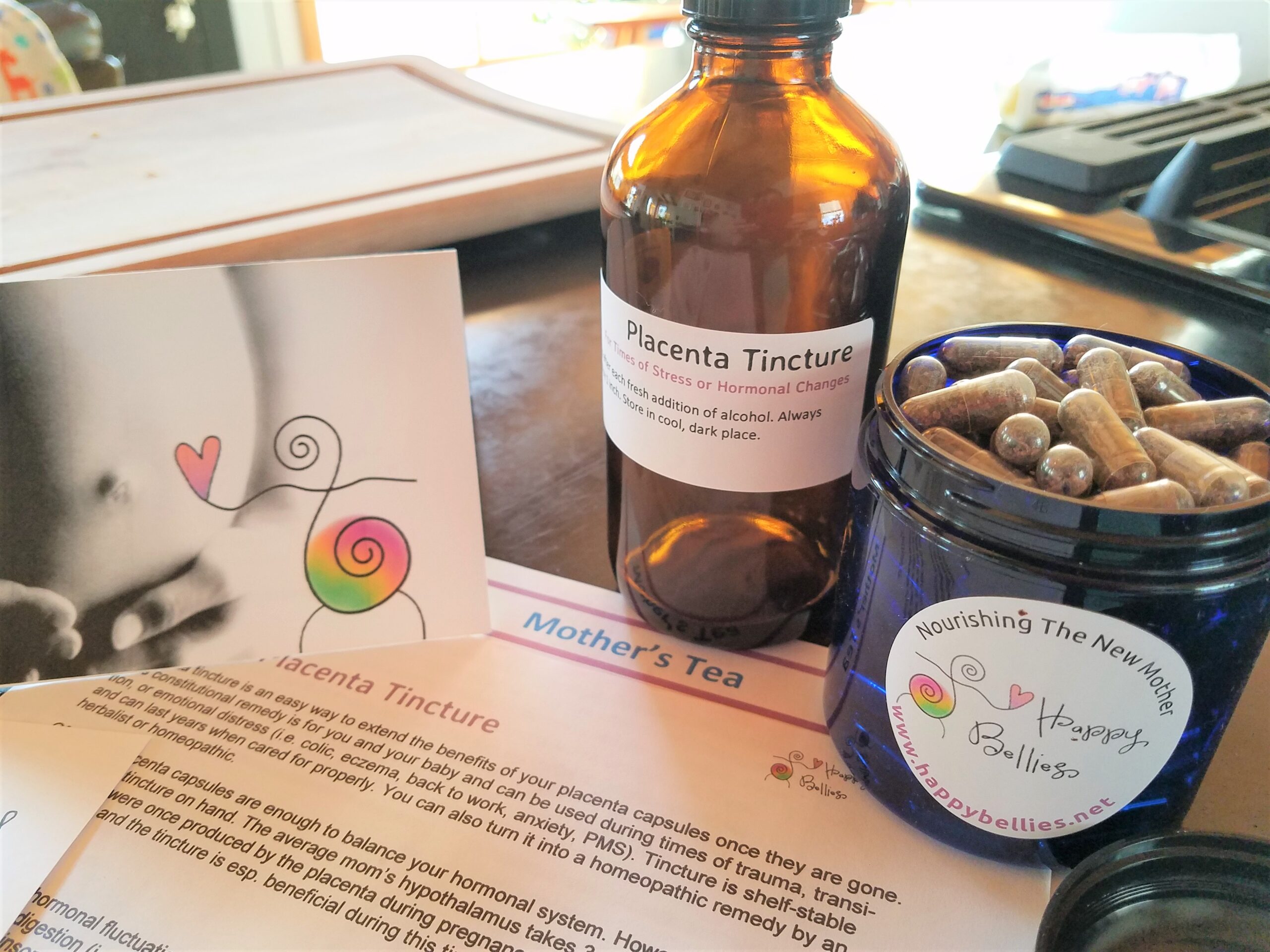
I urge all expectant mothers interested in hiring an Encapsulator to encapsulate the placenta into capsule form to read the below.
I practice as a Placenta Encapsulator in Vermont where there are strict standards to follow in facilities that prepare food made to consume. Let’s say you start a cookie business …. you will need to find a facility in which to make those cookies, adhering to a specific set of rules to maintain your license, including being regularly inspected by Local Health Department.
Laws, regulations, and permits are an important way to ensure that cookies bought and eaten are made in a safe, clean environment by a person trained to handle food; one who strictly follows procedure.
If a person making (and selling) those cookies does not follow rules and regulations then that person may be operating in an unsafe, possibly illegal manner. If things are this strict for a person making cookies then you can understand the regulations in place for a person making placenta capsules.
There is currently no fda-inspected facility in the United States that I know of able to prepare placenta capsules. Hence why I come to your home (or a friend/family member) to make your placenta capsules with your placenta.
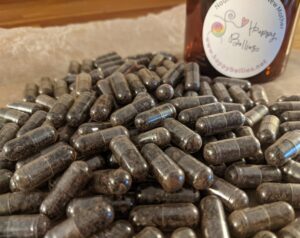
A PBi-trained Placenta Encapsulator like myself only works in the new mother’s kitchen (or friend/family member) because:
- Nowhere in Vermont, and most places in U.S., does an fda-approved environment licensed to encapsulate a placenta for consumption exist. This is why I only encapsulate in the new mother’s kitchen or that of a friend/family member.
- I communicate with the mother after birth to confirm her placenta has been stored safely after birth, during transport, and until I arrive.
- I provide peace of mind to the new mother ingesting her placenta in capsule form that I am 100% operating in a sanitary environment (her kitchen) using an fda method she is welcome to watch.
- Without fda-health inspections in place then there is no way to monitor how your placenta capsules were made unless you know what is happening and how your placenta is cared for. The only way to know your capsules are prepared in a clean environment with a safe method is to have them prepared in your home by someone you trust.
- As a PBi-trained Encapsulationist, I follow Federal (OSHA/EPA) guidelines to ensure safe handling of your placenta in a clean, safe environment; disinfecting bloodborne pathogens after each step.
- I follow a PBi-method of preparation on file with the FDA which means I must encapsulate your placenta in your kitchen or that of a friend/family member who has given written consent.
- You know you are getting your placenta and only your placenta.
- You can observe your capsules being made, even take pictures.
- There is currently no fda-approved facility to prepare placenta capsules other then your kitchen or that of a friend/family member.
Yes, it’s legal to have your placenta prepared in your kitchen or that of a friend or family member with written consent.
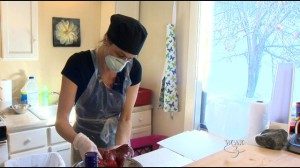
Here I am being filmed by
You get one placenta when you have a baby; or two if you have fraternal twins. If your placenta is handled in an unsafe manner, over-processed, not kept at a consistent temperature in storage, prepared with unsafe handling procedures, ends up being someone else’s placenta (or cross-contaminated with someone else’s placenta being processed at the same time), or causes you sickness then you will miss out on the opportunity to benefit from your placenta capsules.
My training
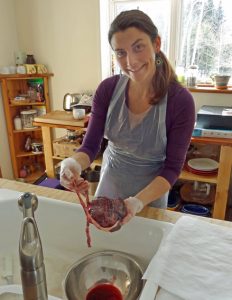 I am a PBi-trained Placenta Encapsulation Specialist to prepare placenta medicinally with a Traditional Chinese Medicine (TCM) method on file and documented with FDA.
I am a PBi-trained Placenta Encapsulation Specialist to prepare placenta medicinally with a Traditional Chinese Medicine (TCM) method on file and documented with FDA.
I maintain my certification as a ServSafe Food Safety Manager and follow procedures used in food service establishments. My handling and disinfection practices meet strict Federal (OSHA/EPA) and local guidelines and follow the same procedures used in licensed small laboratories that handle blood-borne pathogens and medical waste. I operate with integrity and safety.
I have access to a comprehensive database on all things placenta. I can answer questions that you or your care provider have; such as “can you work with meconium-stained placenta?”, “what happens if I had a c-section?”, or “what if I develop a uterine infection during labor?”.
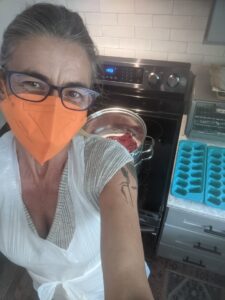
There are plenty of Encapsulators who work out of their own personal kitchen. This is not legal or approved by FDA and they are at risk for losing their business license and being fined. Personally, I do not take this risk nor introduce other risks to the mother I am encapsulating for.
When you allow your placenta to be prepared in the home kitchen of your Encapsulator you open a door to the unknown. Especially, in regards to food safety and sanitation guidelines. Will your placenta at a constant 40 degrees F prior to preparation? Are the appliances (grinders, steamer, knives) sanitized between each placenta worked on? Is the person trained to handle a human organ like the placenta? Are they up-to-date with the disinfection of blood-borne pathogens? Is the kitchen a clean, safe environment? Do they have animals or children that may contaminate your placenta? Do they work on more than one placenta at a time? Do they also prepare food in the kitchen they are using to prepare your placenta?
I do not drive your placenta in my car because I comply with state and federal guidelines. I am unable to legally transport a placenta that I am going to encapsulate. I do not offer a pickup/dropoff service. Most clients ask a friend/family member to bring the placenta safely back to their home fridge transported in a cooler with ice underneath and top of placenta. Once the placenta is in fridge then a day is scheduled to encapsulate. Note to those distasted at the idea of “transporting a placenta” know the placenta is in Ziploc bags and/or a hospital container then bagged. There is little to no risk of leakage. Most hospital staff are familiar with a mother asking to bring her placenta home to ingest in capsule form. Sometimes the mother chooses to keep placenta with her in hospital room or place of birth (with ice in small cooler) and encapsulate once feeling more settled. If the placenta will not be serviced within 72 hours then needs to be frozen properly.
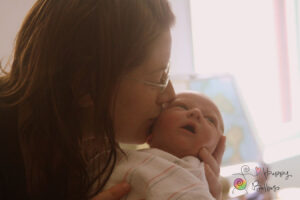
Resource
Selander, Jodi (2010). Certified Placenta Encapsulation Specialist – does it Matter?
Disclaimer: Benefits of placenta encapsulation are supported by ongoing research. However, statements made on this website are not evaluated by the FDA and products from these services are not intended to diagnose, treat, cure, or prevent disease. The new mother client makes the decision to consume her placenta in capsule form with her licensed medical practitioner(s). Tara is a Placenta Encapsulation Specialist not a doctor, herbalist, holistic practitioner, nor pharmaceutical representative. Women who utilize this service take responsibility, and risks to ingest her placenta capsules after giving birth to her baby.
Serving Central VT, Chittenden County & Upper Valley NH

